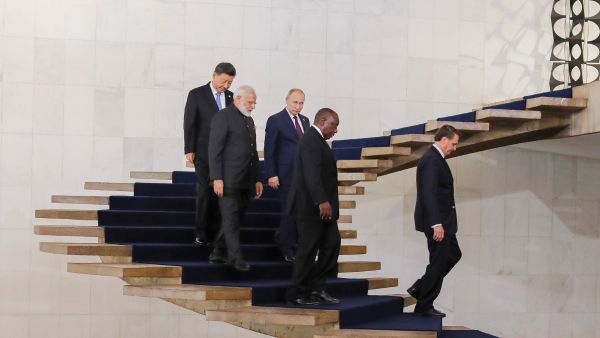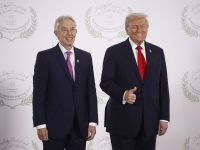News that several MENA states are expected to be soon welcomed into BRICS, the political organisation seen as a direct rival to the G-7, suggests that the Middle East’s relationship with the West is moving into a wintry chapter.
With war in Ukraine squeezing and shaping world politics, competition between the West and its rivals has gained definition. In this context, BRICS – Brazil, Russia, India, China, and South Africa – has naturally sought to build up the organisation’s membership.
The desire to create an economic order removed from the US-led dominated one has gained impetus as Russia and its allies have been disturbed by the velocity of Western-sanctions, from which they seek permanent protection and relief.
MENA countries have been among those touted as potential members in the near future. The president of the BRICS International Forum announced that he expects Turkey, Egypt and Saudi Arabia to join the group "very soon".
The organisation, which has called up speculation as to whether it might qualify as a new geopolitical bloc, seeks to recruit “node” countries of strategic location and economic power. If BRICS members wish to present the organisation as a credible alternative to the US-led economic order, it needs to co-opt as much of the world economy as possible.
The inclusion of the three countries would represent an important win for BRICS and further address the lop-sided distribution of economic power between the West and the Rest: Saudi Arabia with its vast energy reserves, Turkey through its location and economic growth, and the UAE as a global centre of commerce and finance (the inclusion of key commercial and logistical centres within the group would offer more control over world trade).
In particular, bringing in oil-producing states, like Saudi Arabia, into the fold would consolidate BRICS’s control over global oil production itself – whose value in geopolitics has been laid bare this year since Russia invaded Ukraine. From a regional perspective, the incentives for joining BRICS are accruing and the interest expressed by Saudi Arabia, amongst others, has come as little surprise.
Many in the region likely deem it short-sighted to avoid the potential benefits which BRICS, taut with economic/political power and potential, might afford them; in a world retreating to multipolarity, MENA regimes are united in their desire to exploit and exhaust new opportunities. BRICS membership from a regional perspective, therefore, presents a tantalising prospect.
Despite its vast wealth and intimate security relations with the US, Saudi Arabia seeks to grow interactions with China and other emerging economies, given the demands of its restless economy in transformation. But economic interests are only part of the appeal; strategic considerations of geopolitics play a decisive role too. States like Saudi Arabia are presently taking stock of exactly who and who are not their allies.
China and other BRICS members, like Russia and India, could offer similar support but less reproach on the international stage than the US. Indeed, it was symbolic that news of Saudi Arabia’s interest in membership of the BRICS group arrived just ahead of President Biden’s visit to the Middle East in July.
This economic and geopolitical logic is also shared by Turkey and Egypt; however, although the West may regard the accession of countries like Egypt to BRICS as evidence of strategic realignment, it might be more plausible to see it as a natural continuation of foreign policies defined by the principle of balanced international relations.
At the same time, suggestions that BRICS represents an attempt to refashion the 1956 Non-Aligned Movement, whose members sought to minimise the Cold War’s interruptions behind a shield of neutrality, ignores its membership’s antipathy to the West. BRICS seeks to develop and define a credible alternative to the US-led global economy – and particularly the US dollar.
With the economic isolation of Russia, MENA regimes have been reminded of the heavy consequences when states fall foul of Washington. Western sanctions have stifled many regimes in contemporary history, like those of Iraq, Syria, Libya and Sudan. A new economic system out of the thumb of the West, therefore, would enable MENA regimes to indulge their strategic whims with less consequence.
BRICS has caught the interest of other MENA countries who might follow suit; in November came news that Algeria had officially applied to join the organisation. News around BRICS pulling new membership from the Middle East has sparked worthy speculation about regional shifts and realignments: growing interest in the Middle East in the organisation speaks of a growing dislocation between the region and the West today.










